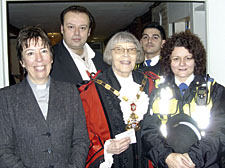|
|
 |
| |

Film organisers Rebecca Hodgson, Ronit Dassa and Louise Lord at the premiere screening |
Rough sleepers who face life – and death – on our streets
They are not forgotten, pledges vicar at service to remember 15 homeless people who died
SCORES of rough sleepers are dying in Islington each year, many found on the streets dead from cold, according to homelessness campaigners this week.
Angry voluntary workers spoke out following claims by the Town Hall that there has been a “reduction” in homelessness, with just four rough sleepers counted over two nights in an annual borough survey last month.
The row blew up following a special service, attended by Mayor Anna Berent, at St Stephen’s Church, Canonbury, on Wednesday. It was to remember 15 rough sleepers who have died in the borough, mostly on the streets, in the past year.
Louis Salvoni, who runs Shelter from the Storm, a night shelter in Canonbury, said: “The council claim they have sorted homelessness out. How come when I open the door of our shelter there are usually about 40 wanting to come in?”
Apart from 80 per cent rate relief on the shelter, the charity gets no funding from the council or the government. It is supported entirely by donations. Last May, two City bankers donated £10,000 to the charity after reading about it in the Tribune.
Mr Salvoni knew of a homeless man who had gone to sleep behind Angel Tube station, a popular spot, before it was fenced off, because of the warm air from a ventilation shaft. The vent was switched off during the night and the man died from hypothermia.
Savas Panas, chief executive of the Pillion Trust homeless charity, based in Horsefell Road, Holloway, organised the church service for homeless people who had died, so that they would never be forgotten.
He explained that each night dozens of people were sleeping rough in Islington for a variety of reasons. “They may have been refused admission to a hostel if they wanted to bring in booze, or they may have somehow slipped through the welfare net,” he said.
Among those remembered was Johnny, 46, who used to sleep in Exmouth market and was well known to shop owners. He had “complex” needs and would not attend a hostel.
Johnny was found by police frozen to death under a tree in Spa Fields in the City in January.
Barbara, a divorced alcoholic with years of street drinking, was getting back on her feet when she was discovered dead from a heart attack at home in her new bedsit.
Mr Panas said the service was an opportunity to remember some great characters and friends. “We’ve never done this before,” he added. “But we felt that these homeless people, including many who were getting their lives together, should not be completely forgotten.”
The service was conducted by the vicar of St Stephen’s, the Rev Nikki Groarke, who lit a candle for each of the deceased.
“They are not forgotten, and each is important in God’s eyes,” she said. St Stephen’s runs a drop-in centre, Manna, feeding 120 people a week.
Philip Wood, 53, a former Islington construction worker made homeless two years ago, revealed how he slipped into life on the streets.
“I was living with my partner and her two children,” he said. “We had a bit of a domestic problem, so I left. I didn’t qualify for emergency housing. I wasn’t an alcoholic, or a drug addict, nor did I have mental health problems.”
He spent days with drinking friends in the park and then went to a Tube station for warmth at night. “You can turn up at a hostel and find it is fully booked,” he added. “I’m still living on the streets. My name is on the waiting list for a hostel.”
Lib Dem community safety chief Councillor Barbara Smith said that the rough sleepers count in Islington was done under specific government guidelines. “Only people who were actually bedded down were counted,” she added. “That’s why we only got four on the two nights.
“The council does a great deal of outreach work with people living on the streets, particularly with the Pillion Trust. I get the sense we are working to reduce the numbers. Certainly, we have cut the number of homeless families by 80 per cent over the past eight years.” |
 |
|
|
 |
| |
| |
|
 |
|